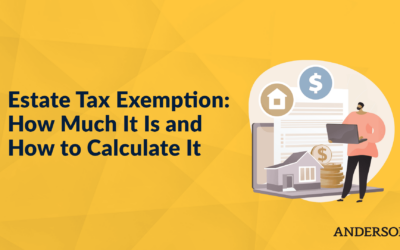Updated February 2, 2021
Many people don’t realize just how important it is to have a professionally prepared estate plan. End of life planning is necessary for ensuring the future wellbeing of your surviving loved ones. Without a proper estate plan, you end up leaving your family with costly legal fees, additional taxes, and a loss of assets– at a time when they are grieving most.
All too often, we hear about celebrities who pass away with no estate plan. This happened with musicians Jimi Hendrix and Prince– and perhaps most recently with beloved singer Aretha Franklin. The famous soul singer had no estate plan in place, and now her grieving children are caught up in an expensive legal battle, spending their inheritance on attorneys, inflated fees and excessive taxes to the IRS. All of this could have been avoided by hiring a legal expert and tax professional who can help you minimize your estate tax liability.
How to Minimize Estate Tax Liability
- Giving Away Assets While You’re Still Alive
- Control of Gifted Assets
- Trusts and Living Wills
- Benefits of a Stepped-up Basis
- Creating a Foundation
- Moving to a More Tax-Friendly State
- Real Estate Tax Deductions
- Hire an Expert Legal Tax Advisor
Estate planning is a complex process. Small missteps can lead to huge increases in income and estate taxes. When every choice has the potential to increase or decrease taxes, professional advice is vital to success.
How Estate Taxes Work
Estate taxes are a percentage of a person’s assets which the government takes when the person dies (hence earning the nickname death tax). The Federal government has an exemption amount, which means assets up to the amount of the exemption are not taxed.
The estate tax on estates over the exemption is 18-39 percent of the first million and then 40 percent of every dollar over a million.
The Federal estate tax exemption in 2018 is $11.18 million per person. Under current law, the Internal Revenue Service will decrease to about half that amount in 2026. If the full $11.18 million exemption is not needed when the first spouse passes, the balance of the exemption can be transferred to the surviving spouse if portability is elected on the estate tax return.
The tax implications of estate taxes can be enormous. The best plan requires a team of experts. The plan should consider Federal and State Estate Taxes, gifting strategies, appreciated assets, the potential benefits of a variety of trusts, and planning for complex family situations or closely held businesses.
3 Steps to Create an Invisible Investor Strategy

Many estate plans are worded in ways that create unintended consequences, such as disinheriting a spouse, because of the increase in the exemption amount. For example, a trust may direct the trustee to distribute the amount of the Federal estate tax exemption to the children and the remainder of the assets to the spouse. Such a plan worked well when the 2017 federal estate tax exemption was $5.49 million. But with the higher federal tax exemption in 2018, the surviving spouse wouldn’t inherit any assets at all if the estate is under $11.2 million.
The way ownership of real estate is structured can affect the estate taxes that will ultimately be paid on the value of the assets. There are a variety of ways to structure real estate ownership that will save time and money when an estate is settled including land trust, Intentional Grantor Trust, LLC, and Limited Family Partnership.
The taxable estate includes all of a person’s wealth including property, assets, capital, real estate, and personal property owned or controlled by the deceased. The definition of controlled by can be very complex. The assets must be appraised in order to determine their value at the time of death. An alternate valuation date six months after the date of death can be used, but all the assets must use the same date.
For example, if someone with expansive real estate holdings died in 2008 when real estate prices were declining rapidly, the alternate valuation date would lead to a lower estate tax.
Giving Away Assets While You’re Still Alive
Most people enjoy using gifting strategies while they are alive to improve the quality of life of the people they love.
The unified credit (11.18 million dollars in 2018) allows you to use the estate tax exemption in advance for gifts you give during your lifetime. This is an important benefit because the gift tax rate is the same as the estate tax rate.
Since the exemption is scheduled to decrease to about $5 million in 2026, wealthy individuals have an unprecedented opportunity to remove assets from their taxable estate. If you expect the value of your assets to increase before your death, gifting them now has the added benefit of removing the growth from your taxable estate.
If you are married, both you and your spouse can each give $15,000 to the same person to each year to remove $30,000 from your estate without using any of your unified credit. There are no limits on how many people you can give $15,000. But be aware that gifts over $15,000 are considered taxable gifts.
If you gift funds for medical or education expenses directly to the provider, the gift does not count toward your annual gift tax exclusion or your unified credit.
Gifts can be in any form including cash, stocks and bonds, real estate, and personal property. When an asset is gifted using the unified credit, its basis is not stepped up. When deciding between two assets with similar valuations, gifting the one with the loss retains the ability to write off the loss. Gifting the asset with a gain means losing the potential value of a stepped-up basis.
If the asset with the gain isn’t gifted until after the first spouse’s death, it can be gifted at the new stepped-up basis if the asset was part of the decedent’s estate.
Control of Gifted Assets
In order to be considered a gift, the assets must be given irrevocably. However, that does not mean you have to give up all control. You can control how the assets are used, temporarily or permanently, by gifting them to an irrevocable trust and naming your heirs the beneficiary of the trust.
There are numerous advantages to using a trust. Distributions to your beneficiary can be conditioned on certain events or non-events such as completing their education, attaining a specific GPA, gainful employment, marriage, or the attainment of a certain age. You can restrict distributions if your heir is incarcerated or becomes an addict.
The only restrictions you can’t make are ones that require illegal activities or provisions that are against public policy. You can also protect assets you leave to your spouse or children from loss in a divorce and protect someone who is not a good money manager with a spendthrift provision.
Trusts and Living Wills
In addition to helping you control gifts, trusts are a powerful vehicle for avoiding estate taxes. Their complexity makes professional advice essential. With good planning, capital gains taxes on real estate investments can be avoided altogether. If you sell inherited real estate soon after you inherit it, the basis and sales price should be nearly the same because of the stepped-up basis.
Living wills are primarily used to avoid delays, costs, and the loss of privacy associated with probating an estate that is distributed by a will. Assets in a living trust are under the control of the deceased until the date of death so the assets are included in the estate.
Benefits of a Stepped-up Basis
The valuation is important for estates that do not owe estate taxes because the heir’s basis is the same as the amount the asset was valued by the estate. The basis of the asset is “stepped-up” to the value it had when the estate was valued. This presents an opportunity to never pay capital gains income taxes on appreciated assets.
For example, if you purchased a rental property for $100,000 and you net $250,000 on the sale of the property, you will have a $150,000 taxable gain on the difference between your basis and the net proceeds.
If this asset was in your estate when you died, the market value of $250,000 would become the stepped-up basis. If your beneficiary sells the asset, the gain will be the difference between the net proceeds of the sale and $250,000.
If the situation is reversed and the asset was purchased at $250,000 and had a current value of $100,000 with an unrealized loss of $150,000, the new stepped-up basis would be $100,000 and the loss would not be recognized.
Understanding how the stepped-up basis works is an important aspect of estate planning for every estate that holds appreciated or depreciated assets. The stepped-up basis should be considered when deciding your gifting strategy and when deciding which assets to sell and which to hold.
With married couples, the stepped-up basis occurs on the assets of the first spouse to die and again, on the entire estate, when the second spouse dies. Estate tax returns can be amended under certain circumstances. It is best to consult an expert before filing an amended estate tax return. If you are faced with tax penalties, it is important to consult an expert about tax penalty relief.
Creating a Foundation
Charitable giving is a common way to decrease estate tax liabilities. While contributions can be made to any organization that qualifies as a charity or educational institution, many wealthy families want control over how their contributions are used. Creating a foundation ensures charitable contributions are used to support the type of work you would like to see done.
Moving to a More Tax-Friendly State
Certain people may be able to save millions by relocating to a tax friendly state. There are many aspects to this decision. A tax professional can recommend various state tax options and help you evaluate the decision from all the angles.
Real Estate Tax Deductions
A skilled estate planning advisor can help you minimize your estate tax liability. In many cases, the estate tax can be avoided altogether. Estate tax could be repealed but only because anything is possible. It is not likely to happen soon.
Estates file two tax returns. The final income tax return for the deceased and an estate tax return. Real estate taxes paid by the estate are deductible on the final income tax return. They are not deductions on the estate tax return. Property taxes may be added to the basis only if they are taxes the seller owed (and never reimbursed you) when you purchased the real estate. Annual property tax does not change the basis.
Hire an Expert Legal Tax Advisor
The estate planning process resembles a labyrinth. A path to lower taxes can seem good at first, but it may have unintended consequences and leave your family lost and confused. Changes in regulations can often lead to costly mistakes. The best way to navigate this maze is with an experienced guide like the professionals at Anderson Advisors.
Once someone passes, the ability to plan is over. At that point, all an expert can do is damage control. An estate plan is necessary for ensuring the proper handling of your wealth and assets upon your death. It’s important to minimize costly taxes, unnecessary legal fees, and undue stress for grieving loved ones.
Anderson Advisor will help you avoid mistakes, financial loss, and unintended family heartache. Our firm can show you the best plan for creating foundations, trusts, and maximizing gifting strategies. Contact us today to schedule your free consultation.
Call Toll Free: 1-800-706-4741 or Contact Us.
3 Steps to Create an Invisible Investor Strategy




















